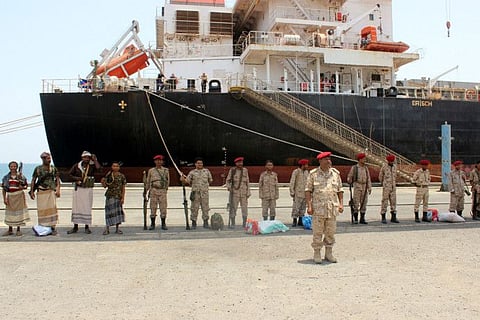Al Houthi rebels can’t be trusted
Don’t believe for one minute that occupiers of Hodeida port have had a change of heart

It has been five months since several rounds of negotiations managed to reach a deal with Al Houthi rebels to get them pull back from their heavily fortified positions in and around the strategically important Yemeni port of Hodeida. And over these past five months, despite numerous entreaties and appeals to the rebel contingent to live up the commitments they gave to the United Nations, they have steadfastly refused to leave their positions, threatening the vital aid and medical supplies that are so badly needed.
Now comes word that the Yemeni rebels are indeed making moves to withdraw from Hodeida, Saleef and Ras Eisa. The reality, though, is that this is a shell game, and the rebels have no genuine intention of leaving their positions, and their moves are nothing more than a ruse — and a dangerous one at that. It’s one thing for the Al Houthis to say they are withdrawing, it is another when it comes to the reality on the ground.
Until such a time there is a verifiable process in place on the ground, the pledge to withdraw is not worth the paper it’s written on. Indeed, until such a time when Hodeida is handed over and safely in the hands of coastguard force — and the withdrawal has been verified and witnessed by the UN — it would be most prudent to consider Al Houthi forces in place and, sadly, with the ability to interfere with the delivery of humanitarian aid as the rebels have done in the past.
The reality too is that this scepticism at the withdrawal of Al Houthi forces is based wholly on the fact that on numerous occasions, since the terms of the truce were agreed in Stockholm, the rebels have said one thing and done the exact opposite. And that duplicity has merely increased the suffering endured by our Arab brothers in Yemen.
Those previous announcements of withdrawal and a sudden acceptance of the Stockholm deal on cessation of hostilities have merely provided the rebels with an opportunity to rearm and resupply their fortifications.
There is one simple reason why Al Houthis are so reluctant to live up to the terms of the Stockholm agreement — the very port of Hodeida itself is their main arming point, where their Iranian overlords and armourers-in-chief supply them with the weapons of war that ensure the conflict in Yemen endures.
The rebels simply can’t be trusted — and doing so would be highly imprudent.



